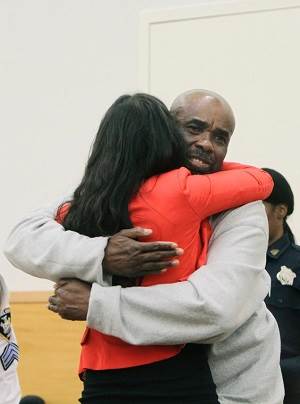A Brooklyn Man Wins a New Trial After 23 Years
Posted on June 22, 2012 by Bruce Reilly
Appellate Division of the New York State Supre…
When I woke up this morning, I knew that thousands of innocent prisoners had active cases in the court system. When I go to sleep, I will know that one man, Derrick Deacon, waited enough time to be vindicated: 23 years. Yesterday the New York Appellate Division overruled the lower court and decided to give the man a new trial. Considering the evidence, the Brooklyn District Attorney would be flushing the taxpayers’ money down the drain by pushing to retry him. This case is in many ways a textbook wrongful conviction, pushed over the top by the Exoneration Initiative. It is worth looking at the fundamentals of the case, in hopes that someday the District Attorneys will begin admitting their mistakes and punishing government wrongdoers.
The Bad Identification
In this case a young woman identified a 5’7 guy around 19. When the police brought in a 6 foot, 34 year old man, the police or prosecutors (according to the witness) leaned on her to give a vague description. She told them it was not Deacon, a man she was not connected to but someone she had known from the neighborhood for about three years. Why would she cooperate? The government agents threatened to take away her children. This is a crime of witness intimidation, commonly framed in movies where the accused sends someone to “pay a visit” to the witness; yet much more common when government agents lean on them with threats of prison or child snatching through Child Protective Services. This witness had to fear both the local gang that carried out the killing, and the government employees sworn to serve and protect people like her and Derrick Deacon.
Government Sits On Exculpatory Evidence
Deacon was convicted in 1990 on weak evidence. In 2001, a high-ranking gang member turned FBI informant and was more than likely considered a credible source of information for every conviction where he gave a tip or testimony. In a seemingly unrelated matter, the informant mentioned that the real killer in Deacon’s case was a member of his gang, Paul Gary Watson. The FBI did nothing with this information. Watson had been deported to Jamaica in 1998, but nobody seemed to care about Derrick Deacon.
The man that this informant was focused on had this information in his own file, and rather than let an innocent man rot away, he got a copy of the FBI interview to Derrick Deacon. Deacon finally got himself into court in 2008.
Justice is Blind, and Courts are Deaf
In 1992, Deacon was told by an appellate judge that these other witnesses who say he was not the killer are irrelevant. One uncooperative witness, who was incarcerated, was not brought to court and forced to testify (or refuse to, in the presence of the jury). Deacon’s pro se issues were deemed without merit. He asked the Court of Appeals to review, yet was denied without even an opinion. In 1993 he asked for a reconsideration, and the Court of Appeals again denied him.
In 1997, Derrick Deacon’s fourth trip to appellate court was pro se. He argued that his appellate counsel was ineffective. This was denied without comment, which is common because the Supreme Court has ruled that the Sixth Amendment right to effective counsel does not apply to appeals- particularly as there is no constitutional right to an appeal. Consider that, in terms of trying to correct mistakes and malice that happens at the jury level… or when trying to present evidence that comes out after the fact.
In 2008, Deacon’s fifth trip to overturn his wrongful conviction was again stymied. This time he had counsel. He had the original witness; he had the FBI informant. The judge missed as easy opportunity to correct a mistake. Somehow, he deemed the informant no longer credible (though the government is likely declaring him credible in some other case being appealed). The judge declared that the deported witness was available to testify, yet did not mention how this Jamaican gang member would overcome his visa dilemma. The judge also ruled that the recanting witness’ testimony was not credible.
Four years after that, over the objections of the Brooklyn District Attorney, the New York Court of Appeals set the story straight. Is anyone liable? Just ask John Thompson, exonerated in Louisiana, who was told by the U.S. Supreme Court that a prosecutor can withhold evidence and there is no liability.
What’s Next?
If 10% of the American prison system is innocent (which is by no means unrealistic) 250,000 people are dealing with similar hurdles to vindication. This is the population of New Orleans. Most innocent people will do their time, or die in prison, without ever having a moment like Derrick Deacon. Fortunately he found someone who finally believed in him, and they had the skills to make Derrick’s voice heard. Every state, every jurisdiction needs a project like the Exoneration Initiative. Every area that has a law school, a few attorneys seeking pro bono hours, and some criminal justice reform activists should be able to start a project tomorrow. Just start with one case.
There are about 249,999 cases to go… but tomorrow another innocent person will likely be found guilty in textbook manner. Hopefully someday the exonerations outpace the bad verdicts. And maybe someday after that we will uphold stricter integrity in the trial and plea process.
Related articles


brilliant article!what a story!